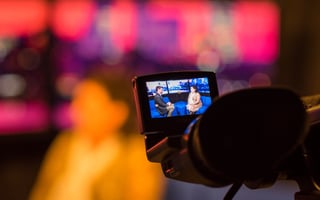How do you feel about radio and television interviews? Most people tend to have mixed emotions....
How does the thought of giving a media interview make you feel?
If it makes you feel jittery, nervous and stressed, the good news is you are not alone.
Even experienced and confident spokespeople worry and can suffer from interview anxiety.
Don't have time to read this blog? You can listen to it here:
And it is easy to understand why.
During our media training courses, people tell us nerves and negative thoughts about media interviews are caused by a fear of being asked unexpected questions (and not knowing the answers), forgetting their talking points and being drawn into discussing subjects they know little about.
There is also sometimes a feeling journalists are out to get them.
Some have had unfortunate interview experiences and are reluctant to put themselves in the same position again.
But media interviews should not be feared. They present a brilliant opportunity to increase awareness of your brand and talk to new and existing customers.
So, how can you overcome those nerves, sweaty palms and shaky hands, make the most of your next media interview and present yourself and your organisation in the best light?
Here are some tips from our media training courses.
Build confidence by starting small
There's no need to jump straight into the media interview deep end.
Sometimes media interview confidence can develop by talking to the company magazine or intranet site.
If you feel a little more confident, but don't think you are ready to be interviewed on TV or radio, start with local newspaper interviews.
Print interviews can feel more relaxed and less daunting than going on air. And in many cases, there is a chance to get back to the reporter after the interview with further information and to check facts.
While it is crucial spokespeople are not complacent about print interviews, getting a few articles with local press under the belt can eradicate nerves.
If it is your first broadcast interview, perhaps start with a pre-recorded one. If you find yourself tongue-tied or suffering a brain fade moment, the journalist will normally be happy to ask the question again.
Overpreparing can increase interview anxiety
There is a difference between being well-prepared and overprepared
When you know you have a media interview coming up, the temptation can be to cram in as much preparation and research as possible.
But studying huge briefing documents for hours and trying to prepare answers to every possible question can add to the stress and pressure many feel.
And it can cause spokespeople to become muddled and unable to recall vital information when the pressure is on. Or sound scripted and over-rehearsed.
Mindfulness has become a bit of a buzzword. We all talk about it. But it is important not to let the interview dominate your thoughts and become your sole focus. Find ways to escape thinking about the interview and increasing your anxiety levels.
Interview preparation should focus on honing the message into something memorable. And on anticipating the tricky interview questions the interviewer could ask.
Difficult questions
And that brings us neatly to the questions you could face.
You might be asked tough questions. You may find yourself dealing with a curveball.
No, you can't see the questions ahead of the interview.
But in most cases, you can anticipate the tricky questions and prepare how you could answer them,
If your company had a period of negative coverage a few months ago, that could be brought into the interview. If the CEO’s pay or bonus attracted controversy in the past, then that too is likely to become a line of questioning, particularly if they are giving the interview.
Remember, awkward questions might be about wider issues. You could be asked for answers to questions about Brexit, the cost-of-living crisis, or a competitor who has been in the headlines. So, do your research.
If you do face a question you can't answer, there is nothing wrong with saying "I don't know". It is much better than saying something you later regret. But don't leave it there. Go on to tell the interviewer what you do know.
Cut out the additional causes of interview anxiety
If you are feeling those nerves, you don’t need additional stress that will cause your heart rate to increase further.
There are some simple tips you can follow to remove additional stress and help you stay calm.
If the interview takes place in a studio, leave more than enough time to get there.
If it happens in your offices, ensure you can’t be interrupted by calls or colleagues. If you are interviewed at home - and many are now - make sure you are in a room where you can't be disturbed by children or pets. And ensure you have the login details to hand.
There is often time before an interview to chat with the journalist.
This can range from a couple of minutes to about half an hour while things are set up. Take this opportunity to build rapport with the journalist, but remember you are 'on the record'.
Remember you're the expert
When that media interview request comes in, and your mind starts racing about the questions you could find yourself answering, you can lose sight of the fact you are the expert.
You know more about the subject than the journalist. They want to talk to you because of your expertise, insight and perspective.
And remember who you are talking to
The vital thing to remember about media interviews is, ultimately, it is not about talking to a journalist.
We tell delegates on our media training courses the reporter is a conduit between you and the audience – your customers.
Bring the human interest
Adding human examples and anecdotes into your early responses will not only help you find your feet in the media interview, but it will also give you some control.
Journalists always look for the human-interest angle. They know their audience will love hearing stories about other people as they have an emotional appeal.
Human interest stories can include personal anecdotes. Tell us a relevant story from your life. It will add credibility to the conversation and influence its direction, allowing those nerves to subside.
Should you do slow breathing exercises?
Yes. Take a few moments to focus on your breathing before a media interview to help you relax.
Take a few deep breaths in through your nose and out through your mouth while doing relaxation exercises like shoulder rolls.
It can help slow your heartbeat. Breathe in for six seconds and breath out like you are blowing out a candle.
Yawn (just not on camera). While yawning is often associated with feeling tired or bored, it is also one of the body's relaxation methods.
If the interview takes place at your office or remotely at home, block out a little time beforehand and ensure you get some fresh air.
What about body language?
Let's say you still feel nervous as you go into the interview.
It can happen and is perfectly normal. But it is vital you appear calm, confident and in control. Maintain good eye contact with the journalist and smile unless delivering awful news.
Fidgeting with hair and glasses or shifting from one foot to another when standing suggests nervous energy and should be avoided.
There's sometimes a little debate in the office about whether 'voice' should be included under body language.
Let's put that to one side for now and say preparing your voice can help you seem more relaxed.
Read aloud a children’s book and use it to vary tone and practice using pauses for emphasis.
Drink water and make sure you have some to hand.
And avoid consuming chocolate or milk immediately before an interview - dairy products can cause a build-up of mucus in the throat. Sugary soft drinks are said to cause a similar problem.
Be realistic
It is crucial to have realistic media interview goals and not place too much pressure on yourself.
Your interview will not be perfect, and striving for perfection is likely to be counterproductive. Mistakes happen, and there are almost always things we would do differently when we watch or listen back to our interviews.
But it is unlikely a media interview mistake will damage your company, your career, or deter a future potential employer – it would have to be a significant foot-in-mouth moment.
People who act as media spokespeople tend to climb the corporate ladder faster because they are perceived as being brave, ambitious and prepared to speak out.
Simulate
Another way of building confidence and banishing nerves is to have a mock interview.
As part of our media training courses, we encourage spokespeople to practise out loud.
Even a conversation with your kids in the car forces you to get to the point and simplify what you need to say.
Use your smartphone to record yourself, and ask a friend or colleague to ask likely questions.
Reflect on your media interviews
No one likes to watch or listen to their interviews.
We tend to put them to the back of our minds and get on with focusing on the day job.
But reflecting on media interview performance can ease nerves when you next need to speak to a journalist. And ensure you better prepare in future.
Consider what went well, what you could have done better and what you didn't expect. Ask a colleague for their perspective and feedback.
Media training
The best way to improve confidence and calm nerves and fears is through a realistic media training course that exposes spokespeople to current working journalists in a safe environment.
It will give them the skills and opportunity to focus on controlling interviews and honing messages.
If you have had training before, it's worth remembering the media landscape and the techniques and methods used by journalists quickly change, and you must keep pace with these developments to properly prepare. In recent years, for example, there has been an increase in the number of media interviews carried out remotely - a format that brings unique challenges.
Being a media spokesperson is like any other skill – the more you practice and the better you prepare, the less nervous and more successful you will be.
Don't let nerves put you off. There are lots of tips you can use to feel less nervous about media interviews. And building experience of the interview process will also help.
Speaking to the media should not be feared. Ultimately, you and the journalist want the same thing - a good interview,
Media First are media and communications training specialists with more than 35 years of experience. We have a team of trainers, each with decades of experience working as journalists, presenters, communications coaches and media trainers.
Click here to find out more about our media training.




